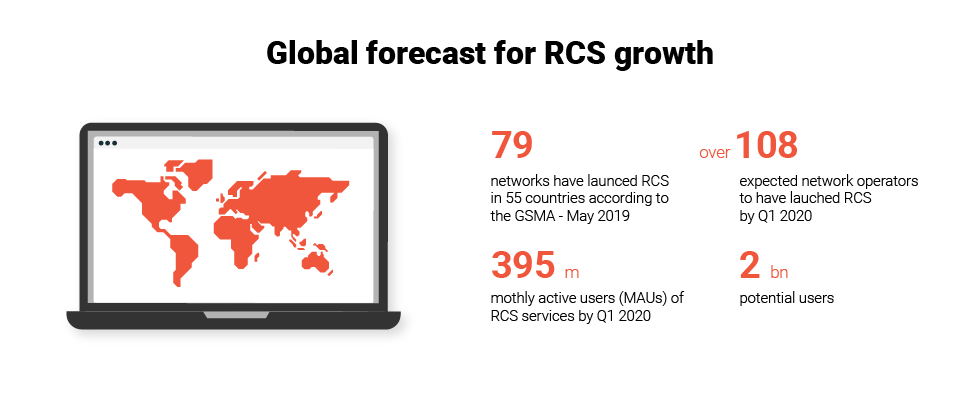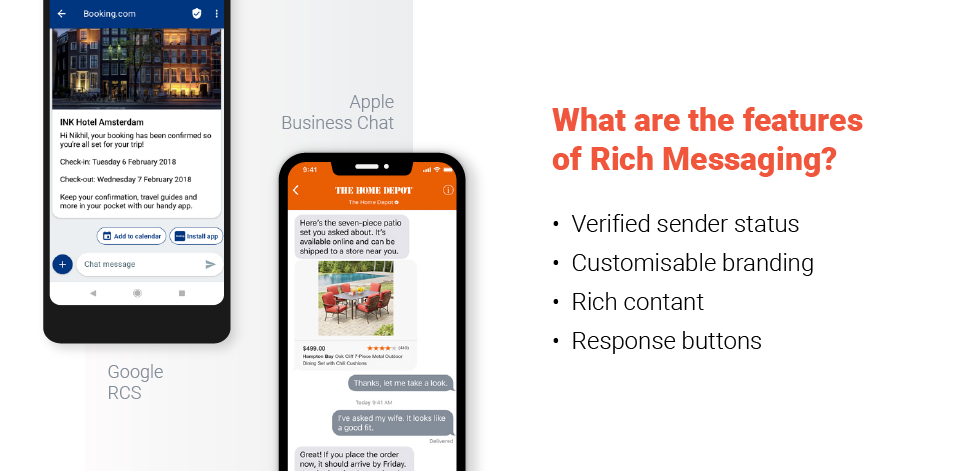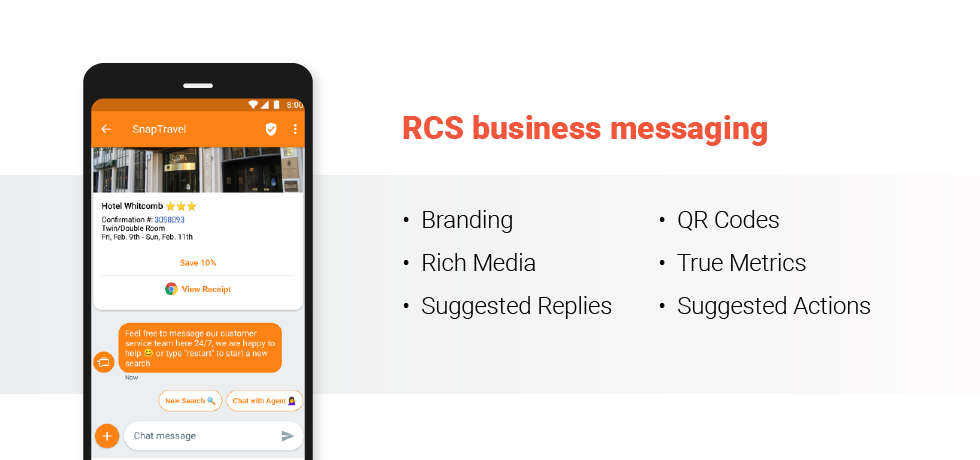Rich Communication Services (RCS) is everything we’ve said it was in our previous articles. It’s immersive, versatile, a long-awaited update to SMS and a great new addition to business messaging. But there still one thing that needs to be addressed – challenges of implementing RCS and pitfalls businesses need to avoid.
Here are 5 key challenges of implementing RCS that, if not addressed, can significantly erode the value of the integration, lead to lost revenue and an ROI worse than expected.
#1: Bad Implementations Means Security Flaws
One of the biggest challenges businesses will face when integrating RCS into their marketing and business messaging strategies is developing the RCS solution itself. Google RCS messaging poses unique technical and logistical challenges, the like of which many businesses may not be used to. This opens up the possibility of a bad implementation of the protocol.
The Problem: The way Google, carriers, and many technological partners have implemented RCS creates security flaws that lead to serious vulnerabilities – especially worrisome for enterprises handling personally identifiable information of thousands of customers. The vulnerabilities, uncovered recently by SRLabs at the Black Hat security conference, are similar to problems with traditional SMS and calls – the possibility of calls and texts to be traced, spoofed, or altered. According to GMSA, the security flaws were a result of bad implementation and that patches will be developed with SRLabs’ data.
Bad implementations of RCS allow hackers to get into the network through a number of ways. For instance, a hacker could simply be on the same WiFI network or have access to the ISP’s servers to alter the requests being sent and received. Some carriers use a One-Time Password (OTP) but SRLabs found that a hacker could try all possible combinations in just 5 minutes – a big problem because those carriers don’t limit the number of tries.

The Solution: This problem can be avoided by having an experienced team of developers with expert knowledge of RCS working on your app and checking it for any vulnerabilities. More importantly, Google will be patching the protocol to make these security flaws impossible.
The problem is relatively contained as of right now because the number of RCS apps are limited (and flawed implementations even fewer). The limited number of affected devices should make patchwork easier for Google and carriers before the full global rollout expected later this year.
#2: Apple Integration (or lack thereof)
Google RCS was created to bring a whole new dimension to texting (and eventually calls) to the public, but for now, Google RCS will only be available for Android users (or about half of the smartphone users).
The Problem: Apple isn’t on board with Google’s idea of creating a new platform for messaging for two reasons. First, it already has iMessage and it’s going strong. Second, Apple has created a brand new option for business messaging called Apple Business Chat. The service is similar to Google RCS messaging but is limited to iOS. The lack of interoperability means businesses have to prioritize investing in one platform but the target audience’s OS preference should make the choice easier.
If a business is going to invest into a new communications channel, it would want to reach all of its users but chances are, the entire customer base isn’t on Android, meaning businesses have to invest in both Apple’s Business Chat and Google RCS or choose one platform and leave out a part of the customer base. So far, Apple has shown no sign of being interested in bringing RCS to iOS which is a problem because the majority of smartphone users in the US are on iOS (56%).

The Solution: Unfortunately, there is no solution for the lack of interoperability between Apple’s and Google’s platforms and official support in the short-term seems like a far-fetched idea. Businesses must identify their user base and then prioritize investing in one platform before developing their presence on the other operating system.
#3: Low Consumer Awareness
The Problem: Despite being a very promising technology and many big brand names already investing in it (CNN, Subway, and Walgreens to name a few), consumer awareness around RCS is still low. This is an even bigger challenge if the target demographic isn’t very tech-savvy.
The Solution: The full-scale rollout of RCS, expected this year, means that Android users on supported carriers would automatically get RCS on their phone as part of the Messages app on Android – users don’t need to go out of the way to be part of RCS. This solves the majority of the awareness problem.
The other part of the awareness problem is engagement. However, engagement is expected to rise because of the benefits of using RCS messaging. The exponentially greater usability and convenience of RCS make it the obvious alternative to SMS for interactions with friends and brands. Case studies from Google have already shown that consumers are quick to adapt to RCS.
#4: Carrier Adoption: It’s Still a Work-In-Progress
More and more carriers are moving forward with RCS integration so this is another low-level threat. In fact, all four major U.S. carriers – T-Mobile, AT&T, Sprint and Verizon have already formed a joint venture called Cross-Carrier Messaging Initiative. CCMI intends to roll out RCS across all future Android devices supported by these major carriers.
The Problem: Carrier adoption becomes a problem when key user demographics depend on smaller or local carriers or when support is required internationally. That said, most major carriers in Mexico and Canada, including Fido, Rogers Wireless, Freedom Mobile, AT&T Mexico, America Movil and more are already supporting RCS.
The Solution: Carrier adoption is much lower on our list of potential problems with RCS than you might have expected because it’s a problem that’s quickly being solved. It’s in the interest of carriers to support RCS and that’s exactly what the biggest carriers are doing.
Overall, RCS coverage in North America is strong and is growing rapidly in 2020 and if the majority of the company’s audience is geographically located in North America, carrier adoption will not be a major problem.
#5: Quantitative Results Are Promising But Limited
Google RCS is already being used by top brands around the world and the results are in – RCS improves customer experience and increases revenue. When Subway used RCS for business messaging instead of SMS, it increased its conversions on sandwich deals by 140% and meal deals by 51%.
SnapTravel saw similarly positive results when it implemented RCS. The travel company found customers using RCS were 21% more likely to make a repeat booking than those who were interacting with the company through SMS.
The Problem: There is no inherent problem with the quality of the data or its sources. The data is trustworthy and the numbers are proven and come directly from the companies using RCS, not just from Google. The issue lies with the quantity.
As of right now, not many companies are publicly sharing their results with RCS or are simply sharing their experience rather than quantitative outcomes which makes gauging the efficiency of this technology in specific industries much harder.

The Solution: Since there is a lack of evidence of RCS’ ability to increase conversions and revenue in every industry, businesses must go the extra mile to do due diligence and ensure RCS is implemented in the best way possible. It’s already proven that consumers interact better with rich media than with RCS so businesses only need to personalize their own RCS implementation to suit their target demographics and get the most of the deal.
What happens if you ignore all of the above
Google’s Rich Communication Services (RCS) is the right step in the field of business messaging. The technology is being used by top brands around to world to improve customer experience, generate more revenue and facilitate growth. However, the technology is still being fine-tuned by Google, carriers, and technology partners and as a company interested in integrating RCS into its business messaging strategy, you want to be aware of the problems that could surface later in the implementation process. This article should give you a better understanding of the problems and how to best tackle them.
Let’s discuss some strategies to help you improve.






